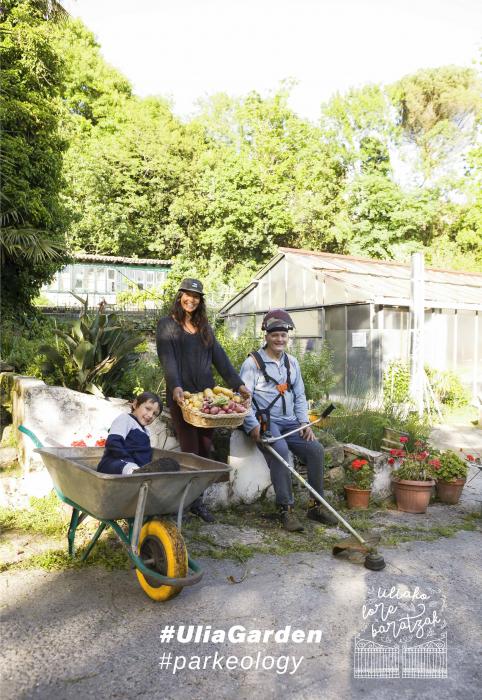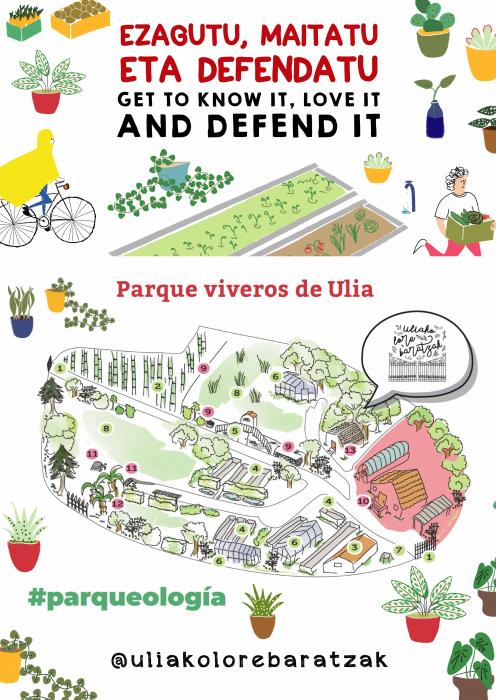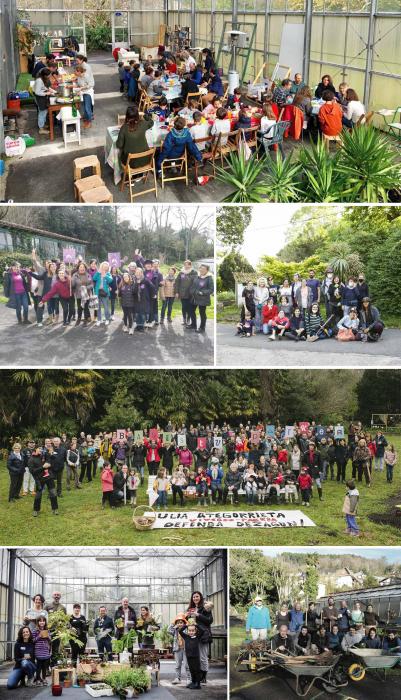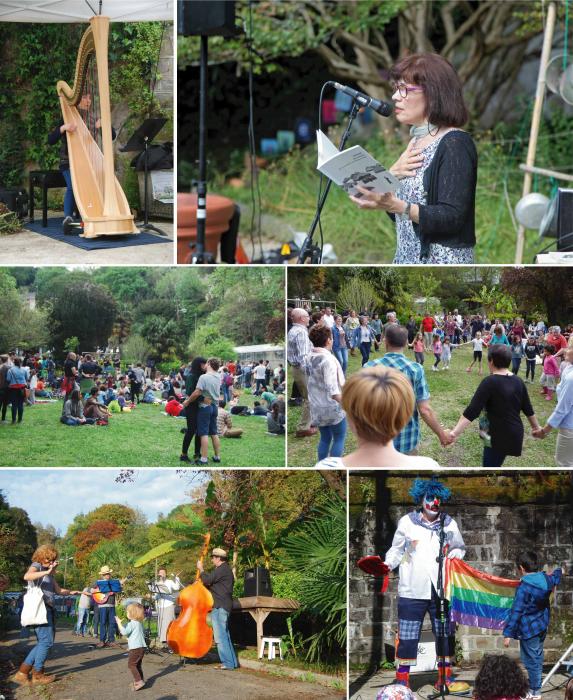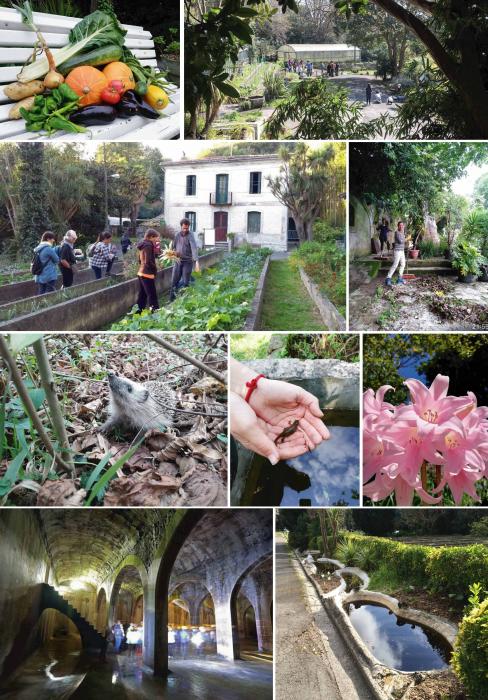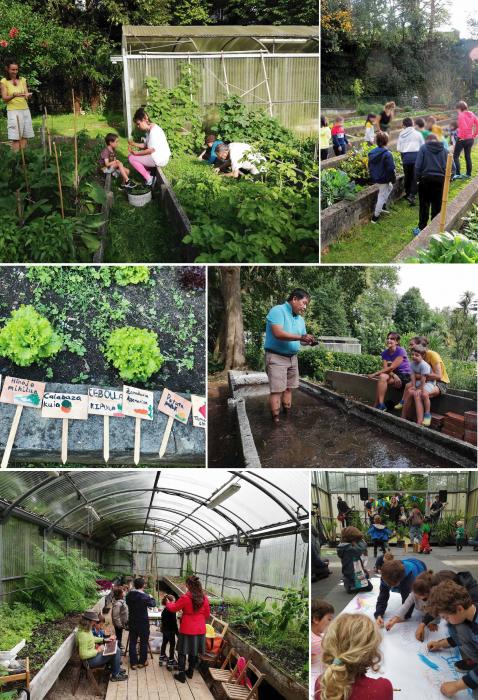I. SUMMARY INFORMATION
Project
269248
Status
Submitted
Award category
Reinvented places to meet and share
You want to submit
NEW EUROPEAN BAUHAUS AWARDS : existing completed examples
Project title
ULIA GARDEN
Full project title
ULIA GARDEN (ULIAKO LORE-BARATZAK)
Description
Our community garden project, Ulia Garden, is focused on transforming a former plant nursery into a community garden managed by local citizens. This project is driven by urban regeneration and agroecological community action. It is nurtured by the voluntary work of many people who, by getting their hands in the soil, seek to weave new relationships between committed citizens, integrate the care of nature as a central concept, and share the beautiful essence of life and a common project.
Where was your project implemented in the EU?
Spain
Guipuzkoa
Paseo de Ulia 15-17
43.322131399903306
-1.9530828102824147
San Sebastian
20013
When was your project implemented?
Has your project benefited from EU programmes or funds?
No
Which programme(s) or fund(s)? Provide the name of the programme(s)/fund(s), the strand/action line as relevant and the year.
II. DESCRIPTION OF THE PROJECT
Please provide a summary of your project
Ulia Garden (ULB) is a community park project that we are implementing at Ulia’s Plant Nursery park, in San Sebastian. This park is a symbol of the city's heritage and among its many treasures lie two cathedral-like underground water reservoirs that date back to the 19th century. The name of this park refers to its former function throughout the 20th century, which was to provide plants and flowers for the whole city with its three greenhouses and multiple raised beds that are still in working order. The property was closed for many years while awaiting an urban development project: the construction of 30 luxury homes. However, in 2013 the neighbours began to organise with the aim of opening it as a public park for the use and enjoyment of all citizens. This still remains the main goal of ULB.
We are working in co-management with the city Council and we have undertaken a community management of the park. This means that we volunteer to take care of the whole park (14,400 m2), dealing with its maintenance and care, and managing the use of greenhouses and water reservoirs. We also organise cultural activities and co-creative workshops with a philosophy of learning by doing. We encourage and practise community work (auzolan, in Basque), aiming to recover this ancestral practice that empowers communities by boosting collectivity and interdependence.
At ULB, civic-minded neighbours have taken the initiative and shaped a project that embodies many labels, such as cultural, sustainable, natural, social, healthy, inclusive, diverse, empowering, community-based, agro-ecological, feminist, and many other features which essence can only be perceived in the park itself. The impact of this project has grown even more after the COVID19 pandemic, since it has reinforced people's need to feel part of a community and to belong to an ecosystem. This is our principal value, a bold project created by citizens for citizens with a vision for a more liveable, social and natural city.
Please give information about the key objectives of your project in terms of sustainability and how these have been met
ULB project is based on sustainability: by working in the garden today, we aspire to a better tomorrow. In practise, we are working to create a space that sets an example to citizens and institutions: a more sustainable management of public resources is possible.
Economic sustainability: ULB is funded by several lines of subsidy from the City Council. The return is a generation of incalculable social value. At ULB we generate social and environmental value that has an intrinsic impact on economic value, by redistributing the circular economy into a spiral of value with the capacity to invest in people, society and nature.
Environmental sustainability: Parks and gardens in urban environments act as havens for nature. In this sense, our mission is not only preserving the flora and fauna, but it also involves promotion, dissemination, and environmental education aimed at a wide range of people of all ages. Thus, we have incorporated horticulture by growing organic vegetables in raised beds and sharing the harvests, we carry out educational programmes on alternative food sources, we have established a consumer group involving local organic producers and we belong to a network of responsible consumption in the city. To close the circle, we have set up a composting centre in the park for the neighbourhood.
Social and life sustainability: Nowadays people live disconnected from nature and from each other. We are in the midst of a major health crisis that has multiplied problems arising from loneliness. In ULB we put the focus on people and seek their sense of belonging to a place and a group, by restoring people's essential connections. The psychological, social and physical benefits of horticulture are already scientifically proven. ULB is an intergenerational project led by women. This favours the sustainability of the project and the group, which is always open to listening and learning from all participants.
Please give information about the key objectives of your project in terms of aesthetics and quality of experience beyond functionality and how these have been met
Since the city council closed Ulia’s Plant Nursery park in 2007, the neighbours have been working to enhance the aesthetic, ecological and historical assets.
In 2016 we promoted a botanical-landscape study of the park that helped us identify, record, and valorise the unique flora and fauna elements that exist in the park and their interaction with the whole. Former work spaces have been now converted into areas of leisure and enjoyment. Our interesting combination of geometry and landscaping creates a unique atmosphere completely different from other city parks.
The intrinsic magic of this place has managed to endure even through enclosure, deterioration and disuse. Today its appearance is the result of many years of small-scale community intervention, with limit resources but lots of love and effort. The park is alive, with soul and an environmental aesthetic that transmits calmness, leaving no one indifferent, least of all passers-by who enter for the first time. Many people come to the community garden once a week, but the positive feelings experienced here last for days. That is why at ULB we feel personally linked to this park and we seek to understand and deepen our relationship with this space.
This park is special, valuable and wonderful for many reasons and for all kinds of people. On a daily basis we see what a paradise it is for little explorers. Here the children play freely to their heart’s content in the different areas of the park: bamboo forest, a pond, climbing trees, a large field, a sandy area, a vegetable garden, etc., and they also participate in all the activities that are proposed, becoming very important subjects in the management, design, and care of the park. The park has also become an artistic stage on numerous occasions: shooting films, photography, poetry reading… It is not uncommon to find musicians gathering to play an rehearse on a daily basis. The beauty of the space creates an inspiring environment for cultural practise.
Please give information about the key objectives of your project in terms of inclusion and how these have been met
In ULB, inclusion is at the heart of our practices, and group work and creating a community underlies each of our activities. ULB is a project led by women, which is why the feminist perspective permeates our practice. Projects like ours help people be aware of our eco-dependence and vulnerability. This makes everyone, especially people at risk of social exclusion, connect to a place, feel part of a group, and create a network of mutual support. By sharing gardening tasks among equals, we restore essential connections: we feel part of something that grows, that is common good, that is created with our own hands and with the help of other people.
Now, thanks to ULB, the neighbourhood now has a space for collective creation. A multicultural, intergenerational, and diverse meeting place capable of breaking down racial and social barriers. To pursue this, for several years we have been lending horticultural spaces to:
· Two associations for people with severe mental illnesses. At ULB they can carry out horticultural work at the same time as the rest of the community, normalising their presence, work and place in society.
· An association for homeless people. We provide them with a raised bed and the use of gardening tools so that they have a place to grow healthy food, and can connect with nature.
· An association for the inclusion of migrants and refugees. Growing crops helps these people connect with their place of origin, as manycome from rural environments linked to agriculture, and this reaffirms their abilities and self-esteem.
· We collaborate with the Basque Sentence Management Service, so that people obliged to carry out community work can do so with the help of volunteers. This helps to reduce the burden of the sentence, empathising and regenerating social motivation.
Cultivating the land together is empowering, and we have found that sharing its fruits indeed promotes trust and collaboration very effectively.
Please give information on the results/impacts achieved by your project in relation to the category you apply for
The park still retains the charisma of its former function, which gives it a particularly beautiful aesthetic. Progressively over the years, we have recovered and restored the greenhouses. We have also promoted a gradual improvement of the whole park, by listening to the needs of the community.
When we asked our community what makes ULB project special, most answers transmitted that the greatest achievement is the capacity to generate and share love, to promote human interconnection.The newsof the project have spread throughout the city and beyond, and nowadays people come from all over the city and even from other towns and cities for special events such as festivals, plant exchange, and workshops.
Amongst other objectives the ULB project has achieved::
To provide a meeting point for individuals and other associations. We collaborate in the co-organisation of events and provide the space of greenhouses for the development of cultural events, political solidarity and assembly.
To bring together more than 30 people once a week to practise urban agroecology, in the urban garden. Furthermore, ULB has generated a consumption group that feeds 25 families with the involvement of 5 organic producers.
To recover the AUZOLAN. Once a month we get together in a large group (up to 50 people), to clean and maintain the park. It usually ends with a small gathering or picnic amongst the participants.
To encourage environmental volunteering and accompany citizens to complete the transition from a voluntary role to a more committed participation within the association.
To promote intergenerational conciliation, placing the elderly and children as valid subjects, promoting active listening and the exchange of experiences
The park and its activities encourage people to assume the philosophy of care: care for the Earth and humankind. We understand the limits and opportunities of nature, the need for sharing and fair distribution.
Please explain the way citizens benefiting from or affected by the project and civil society have been involved in the project and what has been the impact of this involvement on the project
ULBhas had an impact not only on the neighbourhood but also on the city as a whole and on a Basque territorial level. The project, in its almost seven years of operation, has had an impact on the daily lives of many people.
We have recently carried out participatory action-research that will provide us with tools for measuring our activities. Although the results are still preliminary, we know that since January 2021, 175 people (612 in total 74.8% regulars) have participated in the activities programmed by ULB and that 63.6% are women. We would have loved to share more of this interesting data when presenting this project but we are restricted by space limitation.
Although ULB works in the physical reality of the park, much of the work is digital and is based on sharing what we do. Since the beginning of the project we have been communicating closely and authentically both internally and externally and thanks to this, we have a large community of people whose support and participation is through social networks, and whose interaction becomes a very valuable remote community for all of us.
ULB's impact extends throughout the city and the territory; as an example, in 2020 ULB has collaborated with 9 schools and institutes in the area by receiving visits and giving workshops. On another level, we have collaborated with several university students carrying out work in the fields of Architecture, Law and Communication.
2020 was a turning point for the park and the ULB project. After months of confinement and restrictions the park has been an oasis within the urban chaos, as the need to be outdoors in open but sheltered, and safe spaces has been more valued than ever and has been a lifeline for many families. For example, the usual number of participants in the Vegeteble Garden activities has doubled. ULB has been able to adapt to the restrictions and has continued to provide with care activities and occupational livelihoods for many people.
Please highlight the innovative character of the project
Many issues are currently being rethought at a global level: health, climate change, biodiversity loss, the economic model, education, migration policies, social relations, citizen participation, the use of public space etc but all of them involve generating more sustainable and supportive links, whilst placing care at the forefront.
ULB is our own commitment for change. A great laboratory of social innovation with the help of children, young people, adults and the elderly. Faced with the overwhelming reality of a consumerist and individualistic society, our project is innovative because it establishes community relations that generate a foreshadowing proposal. It is also a project based on change, on the transformation of people and nature, on embracing change, and on experimenting with change in order to have examples of our future. Being attentive, participating in the search for solutions, addressing existing problems in the neighbourhood and contributing to reducing social inequalities is how we can generate innovation and social change, starting with our inner selves.
We wanted to meet the challenge and now we have the responsibility to be active agents of this transformation. At Ulia Garden we have been able to adapt to the different stages of the project and we have succeeded in working together with numerous agents. In this sense, we would like to highlight the innovative nature of the relationship between ULB and San Sebastian City Council. As this project takes place on municipal land, it is a place that requires constant interaction between the two parties. Dialogue between public-private management is not easy. However, in ULB we are demonstrating that collaborative co-management of public space is possible with great social benefit for all parties.
We firmly believe that ULB is a good example of all these innovative dynamics and we would like to underline our firm commitment to continue working in this direction.
Please explain how the project led to results or learnings which could be transferred to other interested parties
People who participate in ULB, with different intensities and degrees of commitment, do so for many different motives but they all share the same roots: we all believe in a better future, and we all want to be part of its construction. In this sense, we have had to learn by doing.
As it is a project in which no participant receives financial remuneration for their contribution, many people have come and gone over the six years it has been running. Therefore, the transmission of knowledge generated, the pedagogy in the dynamisation and the horticultural know-how, have been fundamental to sustain the project and its people.
With ULB we have learned to teach people how to build a community and to pass on our knowledge of growing food and regenerating living spaces. Many people come to the park to learn about ULB's trajectory, the steps and decisions we have taken and our main successes and achievements. We have a dream that all the neighbourhoods of San Sebastian can have their own community garden, as every day we see that people are looking for provisions from the land and the need to become part of a community is growing every day, especially after this health crisis.
Although this might seem redundant, the biggest lesson that we have learnt being involved in the project has been to believe in our own capacity to make change. The effects of the society in which we live and contemporary urban planning have blocked our ability to influence the dynamics of city decision-making. With ULB we claim from practice that the management of the city can be shared and collaborative. We question society, but we also transmit this to technicians and politicians who are used to not working in collaboration with their citizens. If we cultivate supportive and committed citizens and give them sufficient opportunity and autonomy, we will generate commitment and fruitful results for all.
Is an evaluation report or any relevant independent evaluation source available?
Yes
III. UPLOAD PICTURES
IV. VALIDATION
By ticking this box, you declare that all the information provided in this form is factually correct, that the proposed project has not been proposed for the Awards more than once under the same category and that it has not been subject to any type of investigation, which could lead to a financial correction because of irregularities or fraud.
Yes
